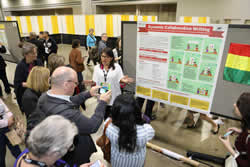
In this feature, TESOL Ambassadors—English language professionals and students who have agreed to share their convention experiences with other attendees—list their favorite sessions from the TESOL Annual Convention in Atlanta, Georgia, USA, and what they took from them, along with some of the best resources they discovered.
In addition, a handful of TESOL strand coordinators outline the trends that cropped up in their strands this year at convention to provide you with a useful glimpse into what is trending in particular areas of English language teaching. TESOL strand coordinators work with the TESOL Conference Services staff, the Conferences Professional Council and TESOL Interest Section chairs to help recruit and vet qualified session proposal reviewers, provide specialized strand-related input to reviewers, and select proposals for the convention.
Favorite Sessions: From the Ambassadors
Issues in Community College ESL
On the afternoon of 14 March, I attended a presentation titled, “Academic ESL and the ‘Co-requisite Model’: Good Fit or Crisis.” David Ross and Kathy Najafi presented this session to a crowded room full of eager participants. The folks in the room were primarily working in community colleges or other institutions of higher education. The presenters talked about the changes occurring in Texas as the state moved to a co-requisite model. This presentation was extremely interesting and important because it provided an example of the co-requisite model with data, and because the co-requisite model is growing in momentum on a programatic and statewide basis. This presentation helped me to better see the possibilities and issues within the co-requisite model. I left with a handful of new connections with community colleges outside of my state, an example of the co-requisite model, and some ideas for further research exploration. As someone who teaches at a community college and is invested in community college academic ESL programs, I was happy to see this topic being addressed at TESOL 2019. (Stephanie N. Marcotte)
Intercultural Competency
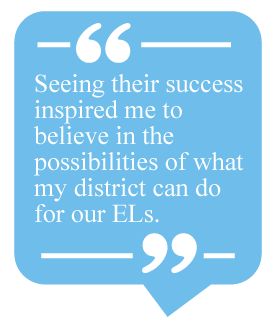
I anxiously awaited the session “Interculturality, Intercultural Dialogue, and Cultural Proficiency in Colombia” (Talibah Sun and Beatriz Peña-Dix) because of the topic. I myself had done metaculturization workshops in Honduras, and I was curious. Dr. Peña Dix blew my mind by showing the value of distinguishing between the philosophy of metaculturization (raising awareness) as opposed to intentionally preparing students with the intercultural skill set to help them face the world as global citizens. I do plan to extend this session by writing stories with ICC skill sets and how to use them to bring about integration versus persecution in a world where people still find ways to be prejudiced. (Suzanne Rajkumar)
Teaching English Pronunciation
Though English language education for speakers of other languages is the main goal, informative teaching activities and professional networking were also on the menu for this years’ TESOL Convention. It was heartwarming to see so many attendees from all over the world taking part in different English teaching and learning activities. One session which particularly impressed me was on teaching English pronunciation. Drs. Veronica Sardegna, Wayne Dickerson, and John Murphy copresented this session, titled “Instructional Models and Priorities for Teaching Pronunciation Revisited.” This session was really interesting, because pronunciation is one of the hardest area to teach in the field of TESOL.
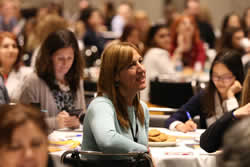
According to the presenters, as pronunciation instructors it is important to know what listeners are listening for and then focus our teaching on those aspects to give pronunciation learners an advantage. This innovative approach revolves around listener-centered teaching for intelligibility; intelligibility is a judgment that listeners make about what they hear. The main goal of this interesting perspective is to help learners to improve their perception, prediction, and production of segmental and suprasegmental aspects of English pronunciation. In nutshell, the presenters’ golden rules for teaching English pronunciation is to focus on training our students:
- to use short phrases,
- to pause effectively, and
- where to pause using the metaphor of peaks and valleys.
(Iftikhar Haider)
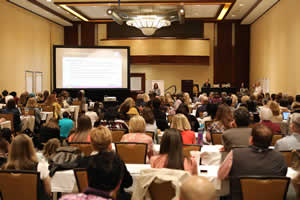
Incorporating EL Strategies for District Success
As a school district level coordinator of our school system’s English Learners Program, I was particularly inspired by the presentation “Closing the Achievement Gap for Elementary ELLs: One District’s Journey.” This concurrent session was directed by Dr. Linda New Levine, Laura Lukens, and other administrators and teachers from the North Kansas City Schools. I was impressed to see the gains they’d made toward improving outcomes for English learners in their district through such an extensive project involving cross-divisional work and collaboration. I took away several insights applicable to my context, and hope to begin efforts to advocate for a similar project in our school district. For example, our district is currently in the midst of a multiyear curriculum development project. I saw in the presentation how the North Kansas City Schools incorporated language objectives and EL strategies throughout the district’s content curriculum. My hope is to bring back to our district the success story of their efforts in order to advocate for a similar effort here. Seeing their success inspired me to believe in the possibilities of what my district can do for our ELs. That is why we come to TESOL, for inspiration and applicable ideas. (Greg Wickersham)
Convention Resources: From the Ambassadors
Book Creation Websites
Throughout the TESOL Convention, I had many great conversations with educators from around the world. Many of these conversations hovered around showcasing student work, creating group projects, and publishing class books. I learned about a few different programs that help to create these books. They include bookcreator.com, blurb.com, and studentreasures.com. While these websites might seem more oriented toward a K–12 setting, there are a myriad of ways to adapt them to meet the needs of a higher education ESL classroom. I would suggest exploring these websites in order to find new ways to publish and share student work! (Stephanie N. Marcotte)
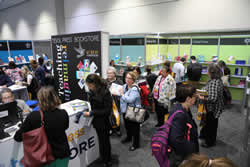
Drama for ELT
I was excited to be introduced to the book Drama in the Language Classroom: What Every ESL Teacher Needs to Know through a presentation by the authors, Dr. Deric McNish and Carmela Romano Gillette. During their presentation, they introduced participants to the use of improv games and techniques in English language learning. My interest was piqued because I have recently become involved in improv in my own city and had already begun to think of ways to incorporate improv games into English learning. This new resource will help me to incorporate another new skill into my English lessons. (Greg Wickersham)
Pronunciation Resources
While attending this session, I also come across some useful resources related to pronunciation teaching. One such resource was Speechcraft: Discourse Pronunciation for Advanced Learners, by Wayne B. Dickerson and Laura D. Hahn (The University of Michigan Press). It has accompanying audio files and a teacher’s guide. I am excited to use this great resource in my own English classes. (Iftikhar Haider)
Trending Topics: From the Strand Coordinators
Advocacy and Social Justice
The Advocacy and Social Justice Strand proposals this year highlighted the ways that advocacy and social justice are woven throughout everything we do as ESL and EFL educators. Sessions focused on opening and making more equitable educational spaces around the globe, for ESL/EFL teachers in Africa, the Americas, Asia, and the Middle East, and for ELs in the United States, including those who may be disabled and/or have special education needs. Presenters demonstrated how immigrant youth, adult ELs, higher education faculty, and any ESL/EFL teacher can focus on advocacy using technology, participatory research methodologies, policies, and different teaching approaches. The strand coordinators were thrilled with the enthusiasm and multiplicity of perspectives presented on these important topics this year! (Heather Linville)
Listening, Speaking, and Pronunciation
The Listening, Speaking, and Pronunciation (LSP) Strand enjoyed a record number of fantastic sessions at TESOL this year.
-
In the area of listening, there appears to be more interest in balancing bottom-up and top-down strategies, as well as high-variability training to improve listening comprehension.
-
Sessions related to speaking focused on error correction and fostering independent learning.
-
In pronunciation, attendees heard about accent prejudice, instructional models for both in-class and out-of-class pronunciation learning, and the effectiveness and value of pronunciation strategy training for both teachers in training and learners. In addition, 2019 pronunciation sessions continued the trend of focusing on intelligibility rather than on accent reduction and a movement away from the view of English as a stress-timed language.
Moving forward, TESOL attendees recommend greater intentionality on the part of the LSP leadership about allocating LSP sessions to the needs of both neophytes and specialists, as well as increasing the number of LSP research-based sessions at future conventions. (Tamara Jones)
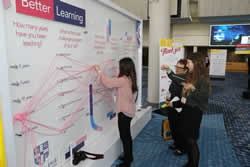
Reading, Writing, and Literacy
This year's proposal pool was very vibrant and diverse. We were especially happy to see diversity not only in terms of a focus on reading, on writing, and on literacy but also in terms of representation across contexts and levels: from very young learners to adult populations; from outside-of-school literacy tasks to academic, workplace, and professional ones. Trends this year included some newer items and some new twists on perennial favorites. Hot topics included
- reader and writer engagement,
- extensive reading,
- text processing,
- genre- and corpus-informed approaches,
- source use,
- storytelling,
- multimodal tasks,
- translingual writing, and
- advocacy for students and ES/FL programs.
Also trending were populations served—EAP/undergraduate students as always but also early learners, students with limited or interrupted formal education, and graduate students. (Ditlev Larsen and Margi Wald)
Personal/Professional Development & Continuing Teacher Learning
TESOL’s Personal/Professional Development & Continuing Teacher Learning Strand includes content relevant to all members of TESOL. All types of presentations are now of great interest and significance to convention attendees. Though our strand represents a new content area for TESOL, the proposals we have received and the presentations at TESOL 2019 show that ours is now a well-delineated content area independent from others and inclusive of a wide range of topics and subtopics including (but not limited to) these:
- learning to teach in new contexts (both face-to-face and online);
- entrepreneurial endeavors;
- reflective teaching; and
- career path rewards, challenges, and milestones at all stages of our TESOL careers.
In addition, there appear to be opportunities for more collaborative partnerships and community networking across TESOL entities and beyond those as well. (Liz England and Shirlaine Castellino)